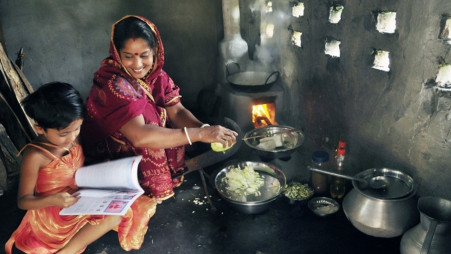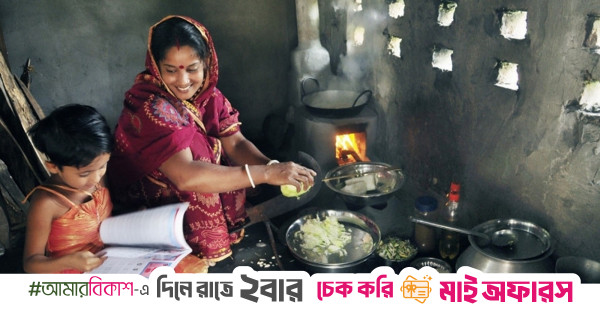GDP would’ve risen by 13.57% if women’s unpaid labour was included
TBS Report
09 September, 2025, 06:25 pm
Last modified: 09 September, 2025, 10:04 pm
A woman helps her daughter with her studies while cooking. Photo: World Bank
“>

A woman helps her daughter with her studies while cooking. Photo: World Bank
Highlights:
Unpaid work contributes 14.1% to 17% of Bangladesh’s GDP
Bangladeshis spend 2,435 hours annually on household work
Women account for 88% of total unpaid work
They spend 7.3 times more hours on unpaid work than men
If women in Bangladesh were paid for household and caregiving work, their contribution would amount to Tk570,000 crore, according to data released by the Bangladesh Bureau of Statistics (BBS).
The estimate is based on 2021 figures, the BBS said in its Household Production Satellite Account (HPSA) report, which measures the economic value of unpaid household activities.
Keep updated, follow The Business Standard’s Google news channel
The report further revealed that if women’s unpaid labour were included in the Gross Domestic Product (GDP), the GDP at current prices in 2021 would have increased by at least 13.57%.
Unpaid household and care work includes essential tasks such as cooking, cleaning, washing clothes, managing the household, and caring for children, elderly family members, and persons with physical or mental challenges.
According to the findings, unpaid work contributes between 14.1% and 17% of Bangladesh’s GDP.
The study notes that if unpaid work were included in GDP calculations, countries such as Sri Lanka, Bhutan, and Pakistan would see GDP increases of 12.3%, 13.8%, and 14.5%, respectively.
BBS Deputy Director Asma Akhtar presented the findings at the bureau’s Agargaon office in Dhaka today (9 September). She said internationally recognised approaches were used to estimate the monetary value of unpaid work.
The study adopted the replacement cost approach and applied three methods – generalist, specialist, and hybrid – to assess unpaid work, she added.
Globally, the hybrid method is recommended for valuing unpaid labour. Using this method, the 2021 estimate of unpaid work reached nearly Tk6.7 trillion, with women contributing 85.37%.
The report draws on data from the Time Use Survey 2021 and the Labour Force Survey 2022. At the event, UN Women’s Nubayra Zehen demonstrated the “Care Calculator” tool, showing how much time an individual spends on unpaid work daily.
The BBS report further highlights that, on average, Bangladeshis spend 2,435 hours annually on unpaid household and care work, with 79% devoted to domestic tasks and the remainder to care duties.
Women account for 88% of this total, spending 2,146 hours per year on such work. Specifically, they perform 89% of unpaid household work and 86% of care work.
Globally, women carry out more than three-quarters of unpaid household work and two-thirds of care work. Every day, women contribute approximately 12.5 billion hours of unpaid labour, with an annual minimum value of $10.8 trillion.
The report notes that the Time Use Survey 2021 examined individuals’ daily routines, considering factors such as gender, location, age, marital status, and education. Results show that women spend, on average, 7.3 times more hours on unpaid work than men.
Recommendations
The report also includes several recommendations. It calls for the creation of an inter-ministerial coordination framework to formally recognise women’s unpaid household and care work.
Policies, programmes, and budgets should integrate care work into economic and social planning, with gender-sensitive approaches to taxation, labour, and social protection.
The study urges the private sector to invest in dignified care jobs, gender-equitable workplaces, and care infrastructure.
Aligning private sector activities with international labour standards and care-related legislation is recommended, alongside institutionalising care work to reduce wage disparities.
Sharmeen Murshid, women affairs adviser, said at the event, “Women’s labour has long been in the shadow of the economy. Today’s report makes their invaluable contribution visible and acknowledged.”


